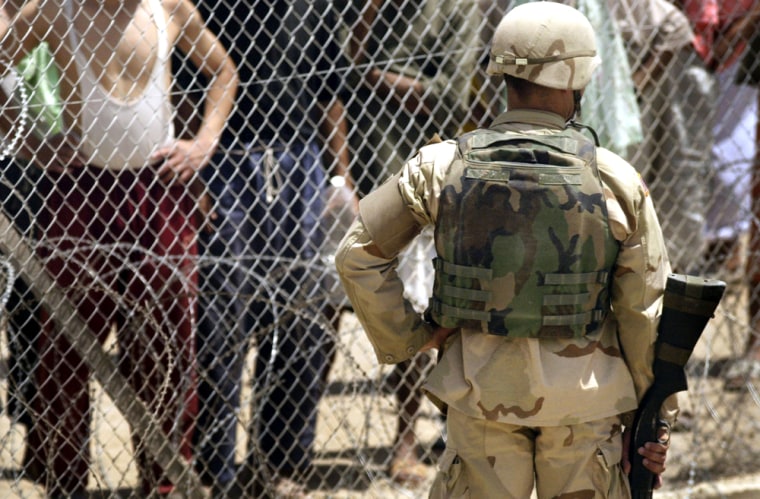Some Iraqi prisoners at the U.S. detention facility at Abu Ghraib said they were abused by troops from Poland and other countries in the U.S.-led coalition, according to copies of statements to Army investigators obtained Thursday by The Associated Press.
The witness statements also include new and more detailed allegations of abuse by military intelligence soldiers, including a civilian interpreter’s accusation that an Army interrogator forced a prisoner to walk naked through a cellblock.
Seven soldiers, all of them enlisted military police who worked as guards, are facing military charges for allegedly abusing prisoners at Abu Ghraib last fall.
Most of the soldiers charged say military and civilian intelligence operatives encouraged them to beat and humiliate Iraqi prisoners to make them more pliable during interrogations. Top Army commanders have said they never condoned any abuse.
The records of interviews by Army Criminal Investigation Division agents obtained by the AP include new allegations that coalition forces had beaten prisoners before turning them over to the Americans.
"I categorically deny this," Colonel Zdzislaw Gnatowski, spokesman for Poland's general staff, told Reuters.
"A few weeks ago the chief military prosecutor carried out an inspection of our detention center and confirmed that all procedures were being followed."
Gnatowski added that Poland had not received any complaints about its soldiers from the U.S. officials.
‘Not U.S. forces’
Sgt. Antonio Monserrate, an Army interrogator, told investigators that two detainees had been “injured by the Polish Army.” Monserrate referred to the inmates by their prison identification numbers but did not provide any further details.
Polish forces operate in south-central Iraq. Prisoners also accused Iraqi forces of abusing them but named no other country in the documents obtained by the AP.
Other civilian and military workers at Abu Ghraib mentioned claims by prisoners that they had been beaten by “coalition forces” before arriving at the U.S.-run prison outside Baghdad.
“Many detainees complained about physical abuse while in detention caused by C.F. [coalition forces], not U.S. forces,” civilian intelligence analyst Luke Olander told investigators.
The statements also give new details about abuses allegedly directly ordered by U.S. military intelligence soldiers.
A civilian translator, Bakeer Naseef, told an interviewer that a U.S. military interrogator forced a prisoner to walk naked through the prison while saying, “Look at me!” Naseef said he could not remember the interrogator’s name.
California guard unit accused
The Army’s investigation of prisoner abuse in Iraq has expanded to accusations that military interrogators with the California National Guard beat up and choked prisoners, authorities confirmed Thursday.
Members of California's 223rd Military Intelligence Battalion, which returned from Iraq in March, are accused of abusing Iraqi prisoners last year at a detention facility in Samarra, north of Baghdad.
The accusations surfaced in an internal Army report obtained by The New York Times that listed the status of three dozen investigations. The report suggests that prisoner abuse by U.S. soldiers went beyond the torture and humiliation of prisoners at Baghdad’s Abu Ghraib prison.
Unidentified members of the San Francisco-based unit “struck and pulled the hair of detainees” during interrogations during a 10-week period in spring 2003, according to the May 5 document prepared by the U.S. Army’s Criminal Investigation Command.
Military intelligence role alleged
At least two U.S. military interrogators, Sgt. Ben Hill and Spc. Gary E. Webster, said their fellow military intelligence troops told the guards to keep prisoners awake and blast loud music at them.
Lt. Gen. Ricardo Sanchez, the commander of U.S. troops in Iraq, has said he never approved depriving Iraqi detainees of sleep. Sanchez and other officers said interrogators were told that sleep deprivation was among the tactics that required Sanchez’s approval.
Defense lawyers are likely to present evidence of abuse by coalition forces and military intelligence operatives during courts-martial for the six accused soldiers who have yet to go to trial. Spc. Jeremy Sivits pleaded guilty this month and is expected to testify against the other soldiers.
The involvement of military intelligence officers in encouraging abuse of detainees has emerged as a central question in the scandal at Abu Ghraib. Military police are responsible for guarding prisoners but are not supposed to be involved in interrogations.
A obtained exclusively Wednesday by NBC News depicted what sources said was the aggressive interrogation of three naked Iraqi prisoners at Abu Ghraib. Sources told NBC News that some of the men in the photos were U.S. military intelligence officers who appeared to be directing the interrogation.
In another photo, a U.S. soldier can be seen pressing his knee into the neck of one of the three prisoners, who have been forced to huddle together on the floor.
“It is uncontroverted that military intelligence was in control of the military police,” said Harvey J. Volzer, a Washington lawyer representing Spc. Megan M. Ambuhl, who has been charged with conspiracy and dereliction of duty, crimes her lawyer maintains she did not commit.
Some soldiers told investigators that they complained about abuses but that nothing was done. Mary Rose Zapor, an attorney for accused Pfc. Lynndie England, said that supported the defense argument that there was a climate of tolerance for abuse inside Abu Ghraib.
“Had my client known she could complain, it wouldn’t have made any difference,” Zapor said.
